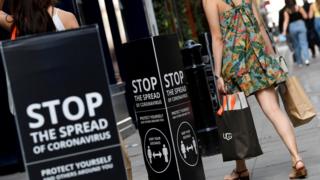UK retail sales climb back to pre-pandemic levels
 Image copyright Reuters
Image copyright Reuters Retail sales rose above pre-pandemic levels in July as a rebound in demand continued, according to official figures.
The Office for National Statistics (ONS) said retail sales volumes rose by 3.6% between June and July.
It said sales are now 3% higher than February before the World Health Organization declared a pandemic and the UK was placed in lockdown.
Clothing sales grew last month and people spent more money on petrol.
July’s rise was not as pronounced as the previous two months. In May, retail sales had increased by 12% and in June they had risen by 13.9%.
Sales in clothing shops grew by 11.9% last month while online shopping fell by 7%.
Ruth Gregory, senior UK economist at Capital Economics, said it suggested that «the recovery in physical shops was more impressive than the headline figure and that shoppers are starting to return to the High Street».
However, the ONS said clothing shops had been «the worst hit during the pandemic» and the volume of sales remained 25.7% lower than in February.
While fuel sales rose by 26.2% between June and July, they remain far below pre-pandemic levels, down 11.7% compared with February.
«Recent analysis shows that in July, car road traffic was around 17 percentage points lower compared with the first week in February, according to data from the Department for Transport,» the ONS said.
While «the outlook could feel a little brighter for retailers», said Emma-Lou Montgomery, associate director at Fidelity International, she also warned that the pandemic was «far from over».
«With the UK now in a recession and many households likely to be tightening their belts as a result, spending on non-essential items may take a hit in the coming months, particularly as we approach the end of the furlough scheme in October.»
The retail sector has been one of the worst hit by the lockdown to stop the spread of the coronavirus.
Earlier this week, Marks and Spencer announced it would cut 7,000 jobs over the next three months.
It adds to 1,300 job losses at John Lewis and Boots’ plan to axe 4,000 roles, while WH Smith has said 1,500 jobs are at risk.
The UK recorded its first recession since the financial crisis when the economy shrank by a record 20.4% between April and June compared to the first quarter of the year.
A recession is defined at two consecutive quarters of shrinking gross domestic product. GDP fell by 2.2% in the first three months of this year.

